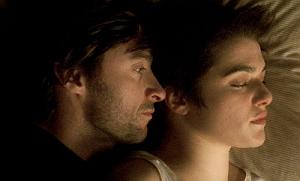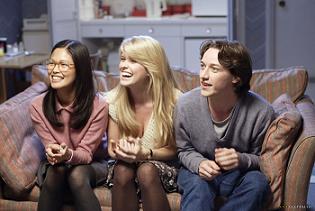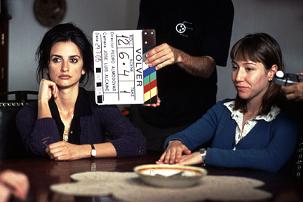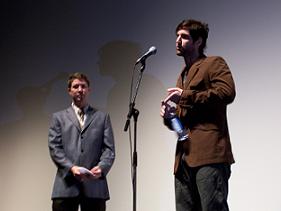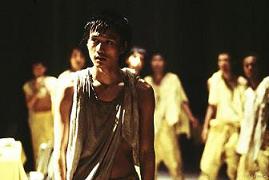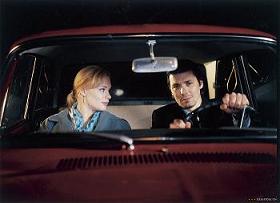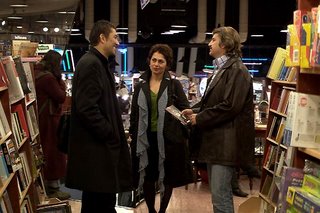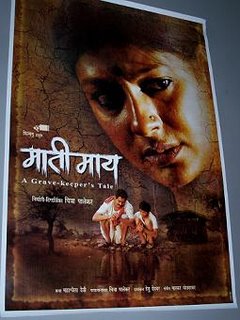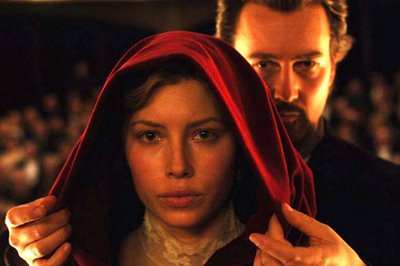 It is imperative to open this review with some personal context: without it, I feel I cannot properly relate what The Namesake (both the novel by Jhumpa Lahiri and now this film by Mira Nair) means to me. Bear with my long, rambly reflections if you can... Toronto, the early 80's: After I was conceived, my parents had decided on the name “Yaseen”, its origin a beloved surah (chapter) of the Qur’an (as well as another moniker for the Prophet.) That was always intended to be my official name, but ultimately my father was convinced by others that it was too "powerful" a title to be bestowed upon such a young child. It was not altogether uncommon a choice, but still a relatively rare one found in my parents' social network of close family and friends. In our culture, hyphenated names are not the exception; in fact, most of my male cousins have two names fixed in the same fashion. Hence, "Ali" was added at the end of "Yaseen" to balance it (the former is also another significant figure in Islamic history.) Growing up, I was always addressed by the whole name (although "Yasu" was a popular nickname as well)... but secretly I hated my long-ish appelation. People would always forget it or, worse, thoroughly mangle it: "Yasmeen" (a female-assigned variant), "Yasmin" or "Yasneen". Finally, once I hit the age of ten, I decided to use "Ali" in place of it - it would be easier to employ in my social circles, at school and with strangers. Short, memorable and mostly immune to mispronunciation. I was relieved, because my name no longer put me at odds with my friends - growing up in Canada during my formative years, I was eager to blend in at any cost. Perhaps "Ali" could never be mistaken for a "Mark" or "Eliot", but at least it was not as foreign and odd-sounding as "Yaseen".
It is imperative to open this review with some personal context: without it, I feel I cannot properly relate what The Namesake (both the novel by Jhumpa Lahiri and now this film by Mira Nair) means to me. Bear with my long, rambly reflections if you can... Toronto, the early 80's: After I was conceived, my parents had decided on the name “Yaseen”, its origin a beloved surah (chapter) of the Qur’an (as well as another moniker for the Prophet.) That was always intended to be my official name, but ultimately my father was convinced by others that it was too "powerful" a title to be bestowed upon such a young child. It was not altogether uncommon a choice, but still a relatively rare one found in my parents' social network of close family and friends. In our culture, hyphenated names are not the exception; in fact, most of my male cousins have two names fixed in the same fashion. Hence, "Ali" was added at the end of "Yaseen" to balance it (the former is also another significant figure in Islamic history.) Growing up, I was always addressed by the whole name (although "Yasu" was a popular nickname as well)... but secretly I hated my long-ish appelation. People would always forget it or, worse, thoroughly mangle it: "Yasmeen" (a female-assigned variant), "Yasmin" or "Yasneen". Finally, once I hit the age of ten, I decided to use "Ali" in place of it - it would be easier to employ in my social circles, at school and with strangers. Short, memorable and mostly immune to mispronunciation. I was relieved, because my name no longer put me at odds with my friends - growing up in Canada during my formative years, I was eager to blend in at any cost. Perhaps "Ali" could never be mistaken for a "Mark" or "Eliot", but at least it was not as foreign and odd-sounding as "Yaseen".At the time, I justified it by arguing that it was more efficient to use at school (substitute teachers were my nightmare) and much easier to jot down on forms. Issues with self-image and cultural expectations simply complicated matters. For the majority of my teenage years, I was eager to place a distance between myself and everything associated with my name. Happily, once I entered my late teens and early twenties, I grew more at peace with all these issues. They are not completely resolved, but everyday I gain more clarity - hopefully, the years to come will be less marked with this kind of ambivalence. And yes, I've recently put my first name into use again, sometimes even preferring it to the one I used for so long in my youth. Rather than feel frustrated with the division of my life along this line, I feel somewhat amused by it. I am not so connected to the religious aspect of it any longer, but I still appreciate (as opposed to cringing at) its uniqueness.
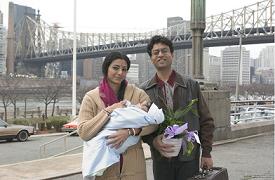 If you are familiar with the trajectory of The Namesake's narrative, you will likely understand why this book seems to align with my experience in an almost frighteningly similar way. And if this reads like a scattershot anecdote, I assure you that it will come into better focus when you become familiar with the protagonist of the story, Gogol. The Namesake quite literally refers to the revelation he ultimately has, coming to terms with not only the origin of the name, but why exactly he has been running away from it for so long. This personal story connects to a larger canvas, describing the life experiences of a first-generation American-Bengali family attempting to navigate the inherent duality of their identities. Other key characters include his mother and father - Ashima and Ashok Ganguli, sister Sonia, extended relatives and a series of love interests who come and go at different points in his life. The novel by Jhumpa Lahiri (best coupled with her stunning and genius Interpreter of Maladies short story collection) is one of the best I have come across. Her prose is rich with detail, yet not overly complex, moving back and forth along time shifts that are seamless. This makes the efforts of director Mira Nair and screenwriter Sooni Taraporevala all the more impressive in this film adaptation, which manages to encompass the mood and specificity of the novel's descriptions without feeling disjointed or "bookish". Not even five minutes of screentime had elapsed before I started to tear up - I was a total goner before I knew it.
If you are familiar with the trajectory of The Namesake's narrative, you will likely understand why this book seems to align with my experience in an almost frighteningly similar way. And if this reads like a scattershot anecdote, I assure you that it will come into better focus when you become familiar with the protagonist of the story, Gogol. The Namesake quite literally refers to the revelation he ultimately has, coming to terms with not only the origin of the name, but why exactly he has been running away from it for so long. This personal story connects to a larger canvas, describing the life experiences of a first-generation American-Bengali family attempting to navigate the inherent duality of their identities. Other key characters include his mother and father - Ashima and Ashok Ganguli, sister Sonia, extended relatives and a series of love interests who come and go at different points in his life. The novel by Jhumpa Lahiri (best coupled with her stunning and genius Interpreter of Maladies short story collection) is one of the best I have come across. Her prose is rich with detail, yet not overly complex, moving back and forth along time shifts that are seamless. This makes the efforts of director Mira Nair and screenwriter Sooni Taraporevala all the more impressive in this film adaptation, which manages to encompass the mood and specificity of the novel's descriptions without feeling disjointed or "bookish". Not even five minutes of screentime had elapsed before I started to tear up - I was a total goner before I knew it. Unlike the novel, the film begins with a glimpse of the defining tragedy that Ashok (Irrfan Khan) experiences as a young student before shifting immediately several years later to the day his life is directly intertwined with Ashima's (Tabu). Their marriage is arranged by their talkative parents, eager to sell their children as great catches ("She knows how to sew sweaters!") Even though the match looks promising, the bride-to-be is informed by her father-in-law that she will have to uproot and move to America where Ashok teaches on a university campus, far removed from her familiar surroundings and beloved ones. Can she handle it? Ashima, half-shy and equally bold, responds: "Won't he be there?". So begins a playful, mostly wordless courtship between the couple; as Lahiri explains and Nair beautifully captures, the depth and intensity of their relationship lies in what is unsaid. "I love you" is an idea utterly foreign to the way of communicating in Bengali marriages. With a series of telling glances, awkward body language and self-conscious smiles, actors Irrfan Khan and Tabu engage in this hesitant flirtation. Soon, a little baby boy joins the family; yet his name causes some anxiety because traditionally, the right of naming is reserved for elders in the family. When pressed to make a quick decision by the hospital staff, Ashok suggests "Gogol" as a pet name for the child, referring to the Russian writer Nikolai Gogol he adores so much. Although just meant as a temporary arrangement, the name sticks: as a child, Gogol insists that he be addressed accordingly.
Unlike the novel, the film begins with a glimpse of the defining tragedy that Ashok (Irrfan Khan) experiences as a young student before shifting immediately several years later to the day his life is directly intertwined with Ashima's (Tabu). Their marriage is arranged by their talkative parents, eager to sell their children as great catches ("She knows how to sew sweaters!") Even though the match looks promising, the bride-to-be is informed by her father-in-law that she will have to uproot and move to America where Ashok teaches on a university campus, far removed from her familiar surroundings and beloved ones. Can she handle it? Ashima, half-shy and equally bold, responds: "Won't he be there?". So begins a playful, mostly wordless courtship between the couple; as Lahiri explains and Nair beautifully captures, the depth and intensity of their relationship lies in what is unsaid. "I love you" is an idea utterly foreign to the way of communicating in Bengali marriages. With a series of telling glances, awkward body language and self-conscious smiles, actors Irrfan Khan and Tabu engage in this hesitant flirtation. Soon, a little baby boy joins the family; yet his name causes some anxiety because traditionally, the right of naming is reserved for elders in the family. When pressed to make a quick decision by the hospital staff, Ashok suggests "Gogol" as a pet name for the child, referring to the Russian writer Nikolai Gogol he adores so much. Although just meant as a temporary arrangement, the name sticks: as a child, Gogol insists that he be addressed accordingly.Of course, the whims of childhood give way to the stubbornness of adolescence, and Gogol (played as a teen and young adult by Kal Penn of Harold and Kumar Go to White Castle fame) begins to resent his name and, by extension, his parents for inexplicably choosing it. In time, he reverts back to his second name "Nikhil", and further shortens it to "Nick", which will perhaps gain him acceptance in school. As the years pass, Ashima and Ashok's relatives slowly pass away, and an ever-growing gap forms between them and Gogol. He does not understand their seemingly pointless traditional lifestyles, and they in turn cannot relate to his experience as an ungrateful teenager. Trips back home to Calcutta to visit family and the requisite Bengali-themed gatherings held back home in Cambridge (among the small immigrant population) provide Ashok and Ashima connections to their familiar language, loved ones and practices. But for Gogol and his equally-indifferent sister, these enforced family events are oppressive and uncompelling. The film then splits its attentions on two separate character arcs: Gogol, who tries to gain a degree of self-confidence and independence both in his professional and romantic life, and Ashima, who must come to terms with preserving her values in a land that is technically her home, but still far removed from the Calcutta of her youth. For both Lahiri as well as Nair, the conception of imaginary homelands and articulating feelings of alienation are key; their overall work is primarily about these ideas.
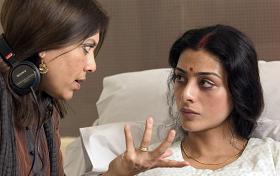 Understandably, a film version cannot accommodate the entire project of a novel (nor should it), and so The Namesake cuts a few subplots (including Gogol's first love Ruth, a girl he meets in college) and regrettably lacks the impact that Lahiri's gift of illuminating character interiority carries. At the same time, this is a human canvas that is completely familiar to Nair, she herself having been born in a different country than the one(s) she resides in presently. The film is closely related with the world of Lahiri's novel; even if the camera does not explicitly reference a certain person or object also found in the novel, astute readers will make the connections. But one does not to be versed in the text to enjoy the film - if the audience reaction at the festival screening I attended is any indication, people from all cultures and backgrounds (reflected in the multicultural Toronto crowd) will respond strongly. This is a film that crosses points of difference to address the bonds between parents and their children. Any individual who has felt at odds with their parents over his or her life choices (or vice versa) will see themselves reflected in these people. Personally, the film was a deeply emotional two hours; by the end of the film, I had a lump the size of a small apple in my throat. The film ends on a bittersweet note, but it suggests hope and possibility beyond the pain suffered. The closing shot is brilliant, bringing the audience full circle and back to where they started on this journey.
Understandably, a film version cannot accommodate the entire project of a novel (nor should it), and so The Namesake cuts a few subplots (including Gogol's first love Ruth, a girl he meets in college) and regrettably lacks the impact that Lahiri's gift of illuminating character interiority carries. At the same time, this is a human canvas that is completely familiar to Nair, she herself having been born in a different country than the one(s) she resides in presently. The film is closely related with the world of Lahiri's novel; even if the camera does not explicitly reference a certain person or object also found in the novel, astute readers will make the connections. But one does not to be versed in the text to enjoy the film - if the audience reaction at the festival screening I attended is any indication, people from all cultures and backgrounds (reflected in the multicultural Toronto crowd) will respond strongly. This is a film that crosses points of difference to address the bonds between parents and their children. Any individual who has felt at odds with their parents over his or her life choices (or vice versa) will see themselves reflected in these people. Personally, the film was a deeply emotional two hours; by the end of the film, I had a lump the size of a small apple in my throat. The film ends on a bittersweet note, but it suggests hope and possibility beyond the pain suffered. The closing shot is brilliant, bringing the audience full circle and back to where they started on this journey.In a performance that undoubtedly confirms her status as one of India's top actors, Tabu is the spirit of The Namesake. Asked to convincingly portray the shades of a shy, loving soul from a twenty-something student all the way to a mother nearing fifty, Tabu is totally convincing. Entirely respectful of her character's naïvety and innocence, it is impossible to take your eyes off Ashima on-screen. A scene that requires Tabu to reach deep and express unexpected, lonely desolation is heart-wrenching to watch. It is one of the strongest performances I have seen in several months. As Ashok, Irrfan Khan is equally endearing (this is a reunion for both him and Tabu who together played the Macbeths in Vishal Bharadwaj's Maqbool, an Indian spin on the Shakespeare play), bringing dignity and sensitivity to this soft-spoken man. In perhaps the pivotal role, Kal Penn is fine if uneven in a dramatic turn; his Gogol runs the risk of losing a lot of sympathy (and frequently he does), but Penn is unafraid to venture to those dark places. Jacinda Barrett is likable in her brief role as Maxine (a girlfriend of Gogol's that Ashima and Ashok have trouble adjusting to), and Zuleikha Robinson makes a totally convincing Bengali-French-American who catches Gogol's eye later on. Dependable character actress Brooke Smith is a pleasure to see again as a confidante Ashima befriends working at the neighborhood library. Even author Jhumpa Lahiri makes a quick appearance as an "auntie" at Gogol's naming ceremony. But this film belongs to Tabu: The Namesake may deal foremostly with Gogol's self-journey into maturity and self-acceptance, but Ashima is positioned at the centre of this story.
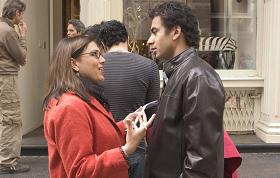 As expected in any Nair film, The Namesake is vibrant with colour, laughter and speaks a completely cinematic language. Despite the fact that the movie covers a lot of ground in its running time, the camera sweeps along without losing focus. The director does an exceptional job maintaining a strong momentum and delivering a delightful dose of comedy (Tabu's expressions are utilized to perfection - watch her eyes in the courting scenes with Khan, or the moment she meets the slightly over-friendly Maxine for the first time.) The cinematography by Frederick Elmes is sumptuous, especially the shots captured in Calcutta where the Gangulis reside during their family vacation. The film could be described as a happy medium between the intimacy of Monsoon Wedding's documentary-style approach and Vanity Fair's sexy, oppulent mise en scène. The musical score by U.K.-based d.j. Nitin Sawhney impressively matches and further accentuates Nair's eye on the proceedings.
As expected in any Nair film, The Namesake is vibrant with colour, laughter and speaks a completely cinematic language. Despite the fact that the movie covers a lot of ground in its running time, the camera sweeps along without losing focus. The director does an exceptional job maintaining a strong momentum and delivering a delightful dose of comedy (Tabu's expressions are utilized to perfection - watch her eyes in the courting scenes with Khan, or the moment she meets the slightly over-friendly Maxine for the first time.) The cinematography by Frederick Elmes is sumptuous, especially the shots captured in Calcutta where the Gangulis reside during their family vacation. The film could be described as a happy medium between the intimacy of Monsoon Wedding's documentary-style approach and Vanity Fair's sexy, oppulent mise en scène. The musical score by U.K.-based d.j. Nitin Sawhney impressively matches and further accentuates Nair's eye on the proceedings.In her introduction to the film, Nair discussed how she is profoundly inspired by the medium of photography, its significance, and how it plays a big part in how she approaches directing films. As such, in The Namesake, Nair is interested in the mementos that people hold dear in times of despair or remembrance. Books, pictures, slippers, letters, and flashes of memory all provide the characters a way to access the past. In a delightful exchange, Ashima playfully confesses to Ashok that she decided to marry him because she was impressed by his dress shoes, stamped "Made in the U.S.A." Sly references like this also demonstrate Nair's focus on material items and the connections that are accordingly made between East and West. These saved items show how the two countries are linked together by the people who live in them (even if they reside there only in memory.) Nair also dedicates the film to two legendary Bengali artists - Satyajit Ray and Ritwik Ghatak, movie-makers who put India and later Bangladesh on the map. The Namesake is a rare film that truly lives up to the tradition established by those directors. I believe she is one of the most important directors of Indian origin working today. The experiences of the immigrants who move across the globe but still retain their homeland in their hearts are given a voice in this film. B+

